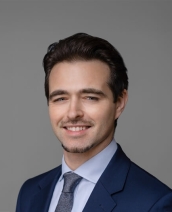Peter Kaznacheev
Principal
Peter has 20+ years of experience across management consulting, energy industry, and economic development; he advises public sector and corporate clients on a broad range of strategy and transformation topics.

Education
Past Experience

Peter is a Principal within the Energy & Utilities Practice at Arthur D. Little Middle East. He has over 20 years of consulting and industry experience specializing in energy, infrastructure, and the public sector in the Middle East and globally.
Before joining Arthur D. Little, Peter worked as a Principal at Roland Berger. Prior to that, he was a Project Manager and Consultant with the World Bank and other international organizations, and a Business Developer at the Exploration and New Country Access Division of BP in the UK. Throughout his career he acted as an advisor to governments and state-owned enterprises in 17 countries across the Middle East, Europe, Central Asia, S-E Asia, and Africa.
On a functional level, Peter works across a variety of project types: transformation of large capital investments; project management offices; public-private partnerships; market entry strategies; energy efficiency programs; and urban master plans. An area of particular interest to Peter is related to economic reforms and social development in countries exporting mineral resources.
Peter received a master’s degree in international economics from the Johns Hopkins School of Advanced International Studies (SAIS) in Washington, DC.
In his free time, Peter enjoys hiking, running, exploring contemporary architecture, and reading history books.

Aluminum: The path to green

Peter is a Principal within the Energy & Utilities Practice at Arthur D. Little Middle East. He has over 20 years of consulting and industry experience specializing in energy, infrastructure, and the public sector in the Middle East and globally.
Before joining Arthur D. Little, Peter worked as a Principal at Roland Berger. Prior to that, he was a Project Manager and Consultant with the World Bank and other international organizations, and a Business Developer at the Exploration and New Country Access Division of BP in the UK. Throughout his career he acted as an advisor to governments and state-owned enterprises in 17 countries across the Middle East, Europe, Central Asia, S-E Asia, and Africa.
On a functional level, Peter works across a variety of project types: transformation of large capital investments; project management offices; public-private partnerships; market entry strategies; energy efficiency programs; and urban master plans. An area of particular interest to Peter is related to economic reforms and social development in countries exporting mineral resources.
Peter received a master’s degree in international economics from the Johns Hopkins School of Advanced International Studies (SAIS) in Washington, DC.
In his free time, Peter enjoys hiking, running, exploring contemporary architecture, and reading history books.

Aluminum: The path to green
More About Peter
- Johns Hopkins University SAISMaster of Arts, International Economics
- Roland BergerPrincipal
- BP PlcBusiness Development Advisor
- World BankProject Manager / Consultant
